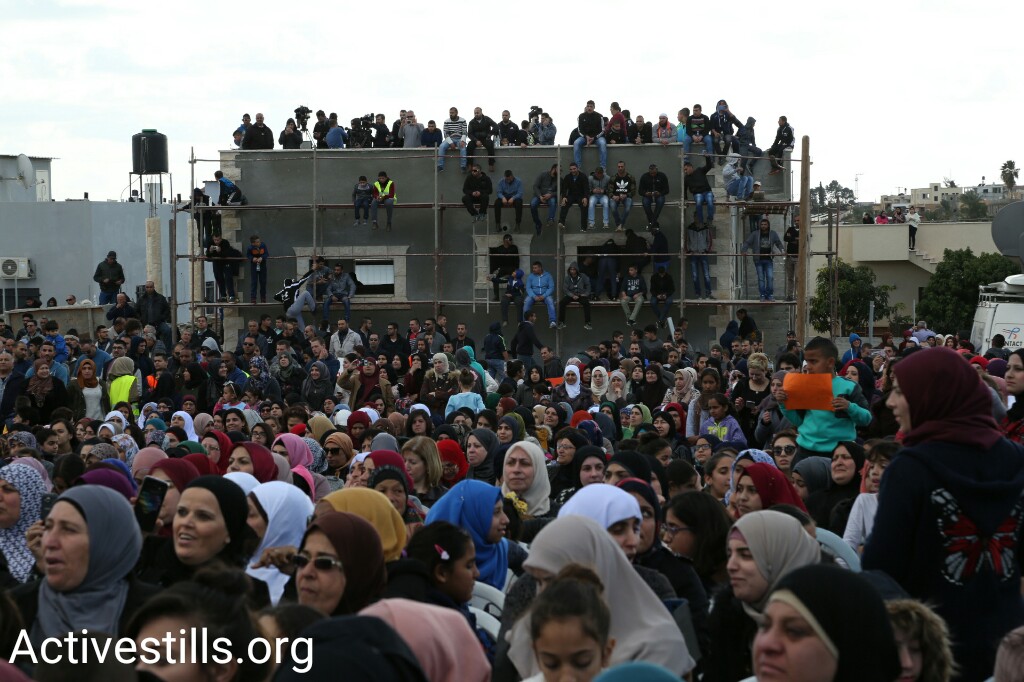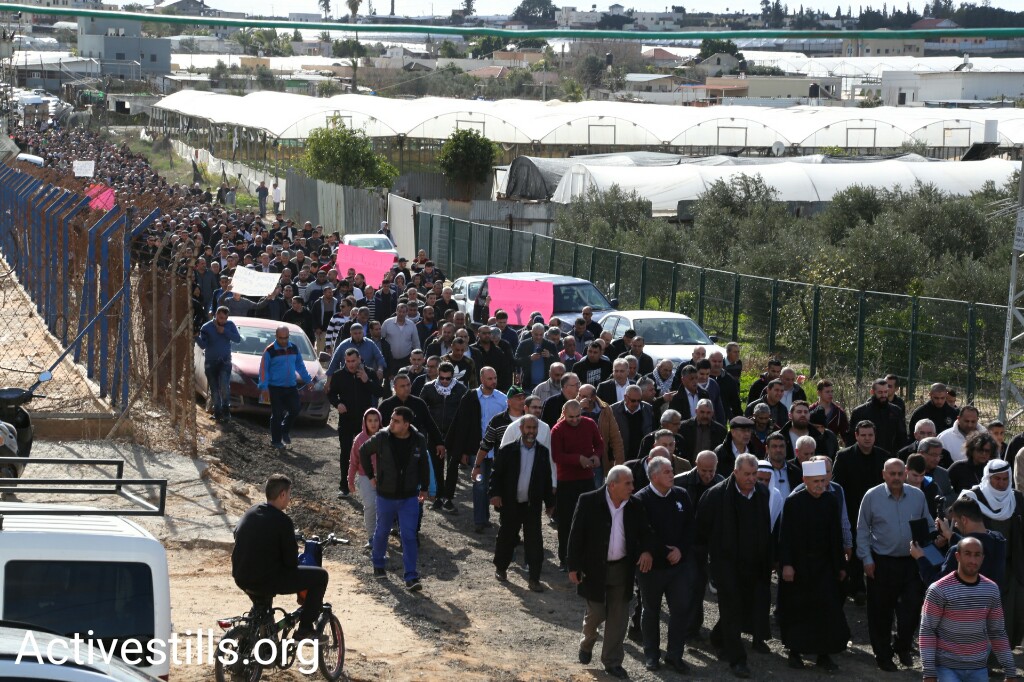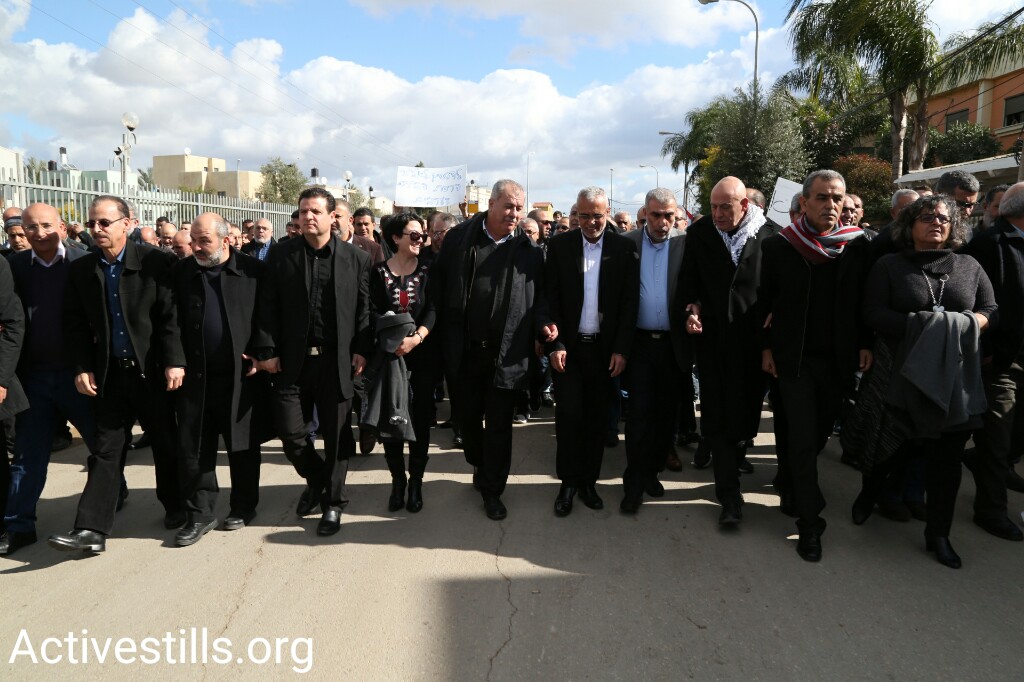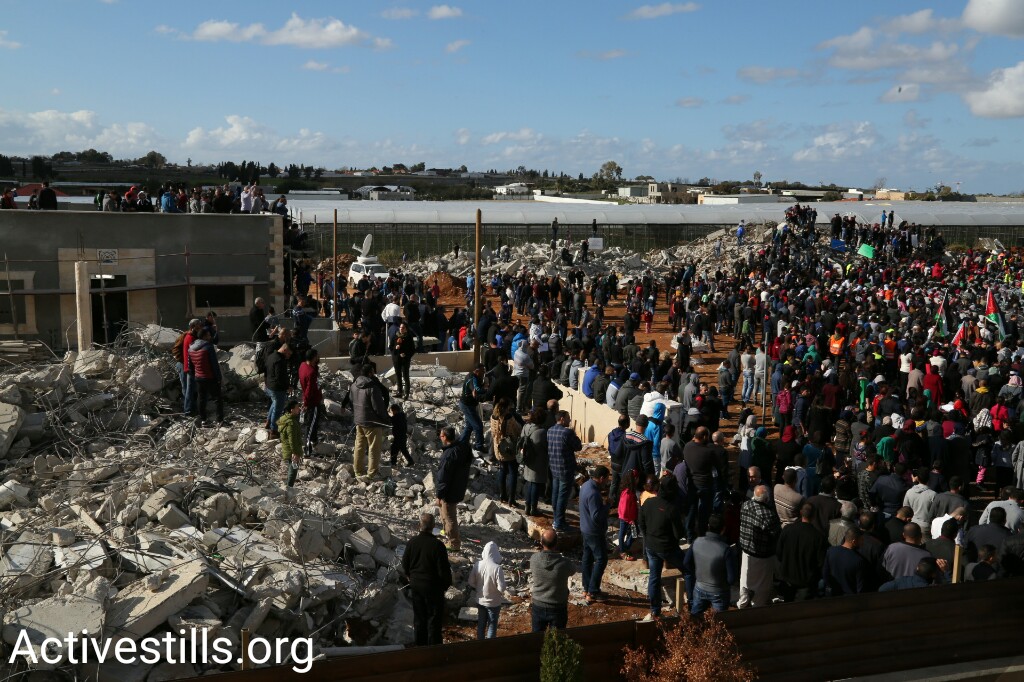Hundreds of Palestinian citizens demonstrate against the demolition of homes in the Arab town of Qalansuwa earlier this week.

In a week during which the Israeli media focused mostly on itself and Benjamin Netanyahu’s latest corruption scandal, we in the Arab community focused on our homes, and our basic right to live on this land. This past week the government destroyed 11 homes in the town of Qalansuwa, striking a blow against a fifth of the population.
The prime minister shared a Facebook post titled “Our forces destroyed Arab homes,” unleashing the venom of his followers, hungry for revenge and driven by hatred, since blaming Arab citizens for arson is no longer effective. One Facebook post and 11 demolished homes. The Joint List called an emergency meeting, as did the Arab Higher Monitoring Committee, Qalansuwa’s mayor stepped down, and a general strike was called. Social media networks were flooded with photos of bulldozers and armed security forces diligently destroying homes whose status was in the process of being formalized. It was an underhanded move; no one could oppose it or even expect the bulldozers at 6 a.m.
The message delivered to the average Israeli went as follows: the government takes action against illegally-built homes in both Qalansuwa and Amona. But the only thing these two places share is that they are built on Palestinian land: in Qalansuwa the residents built the homes on their land, and in Amona the settlers stole land that does not belong to them and built their homes using the public’s money. In Qalansuwa the homes were demolished, while the residents of Amona are taking their fight to the High Court to prevent the demolition of their outpost. The residents of Qalansuwa will not be afforded alternative housing, the settlers will be handsomely reimbursed with both housing and money.
How can one even make the comparison? With Netanyahu, everything is possible — as long as the people keep supporting him. The news of the demolition “calmed” supporters of human rights following claims that no one was living in the homes that were demolished (which turned out to be false), bringing an end to the public discussion.
Who gets to speak?
The Arab leadership was roundly criticized for using the tired tactic of calling for a general strike in the Arab sector. There were calls among the community to rebuild the homes, for the resignation of the Arab MKs, collecting donations for the families, shutting down the streets with mass demonstrations, turning to international bodies, and other ideas that simply won’t advance a construction master plan for Israel’s Arab communities that has been delayed for 30 years.
The turnout for the general strike was very good regardless, yet the event received scant coverage in the Hebrew media, as opposed to in the Arabic media. Immediately thereafter came the call for a mass rally in Qalansuwa on Friday to be held after the noon prayers, near the ruins of the homes, in protest at the Israeli government’s hostile policies.
Following the demolitions, I published a critical post with the question: “Who will speak at the rally?” When it comes to our protests, this is the million dollar question — after all, Arab politicians have few opportunities to speak directly to the people. Muhammad Barakeh, the head of the Arab Higher Monitoring Committee, surely has a free pass to speak; everyone else needs to work hard to have that opportunity. But will women be given the chance to speak, I asked? That’s when I got the typical responses of “what’s the connection between women and home demolitions?” and “we need to focus on the struggle and not trifles.” Except that those responses came from my mother — so I shut my mouth (something I am unaccustomed to doing) and did not respond.

The lecture I was supposed to deliver at the joint Arab-Jewish village Wahat al-Salam/Neve Shalom on the joint struggle between Arabs and Jews, as well as the struggle of Arab women, was moved to Qalansuwa. This allowed the young leaders from mixed Arab-Jewish cities to take part in the protest.
I walked alongside the masses toward the rally that filled the streets of the rural town. We headed away from the city center, walking between spacious homes and beautiful fields full of strawberry bushes. The activists cried out, “We are not afraid, Israel is a terrorist state,” “Unity between Arabs and Druze, Islam and Christianity,” and “Hand in hand, we will build our homes on our land.” The rally organizers handed out water and coffee to the thousands who arrived from all corners of the country. Luckily, the weather cooperated with us.
The star from Taybe
The marathon of speeches began, as expected, with Quranic verses. The reader, who had a beautiful, captivating voice, chose verses that speak about tolerance and adhering to the path of justice. Even if the nation suffers injustices, faith and patience will bring relief in the end.
Barakeh spoke first, and as usual talked at length to address every issue possible. He attacked the racist government and its persecution, tying the outlawing of the Islamic Movement with the jailing of the movement’s leader, Raed Salah, and the accusations against the Balad party as well as the arrest of Balad MK Basel Ghattas. Barakeh further explained why a general strike was necessary (I was not convinced, nor were the people sitting next to me, surrounded by a multitude of women), railed against the calls for the Joint List MKs to step down, arguing that doing so would only serve the government. I happen to agree with Barakeh on this point — if Arab elected representatives resign, the next step will be physical confrontation and a far more difficult struggle. Although the idea of a Zionist Knesset without Arabs is rather entertaining — it will be interesting whether we would be able to distinguish between coalition and opposition in their circus performance in the plenum.
Barakeh also powerfully quoted Palestinian poet Tawfiq Ziad:
“We are here to stay
Shards of glass and cactus
As long as in this soil
Za’atar, figs, and olives grow
We are here to stay.”
Barakeh even called on the masses to support the upcoming protest actions, promising that a plan is on the way. I cannot get the details of this plan, of course, since I have no idea what it is.
The mayor of Taybe, Shu’a’a Masarwa Mansour spoke after Barakeh. He is a rising politician who was elected to lead one of the most tough cities in Arab society, after years of being governed by an appointed committee. He speaks the language of the Israelis, shows up at public events, and it seems that after Friday’s rally, we can crown him as the “Head of the Southern Triangle” (the area in which Taybe and Qalansuwa are located). The elderly woman sitting behind me was enthusiastic about him, saying “God protect him, we need many like him.”
She was right. After the introduction in Arabic, he addressed the Hebrew media and spoke directly to the prime minister: “We still believe in democracy, we want to live in peace and tranquility with our neighbors and develop. Your policies are pushing our youngsters into a situation of no choice, and soon we will lose control. Anyone who saw the forces that took over Qalansuwa, understands that the Israeli government destroyed this place just like Aleppo. Aleppo is here, ladies and gentlemen.”

Later in the rally, one of the homeowners got up to speak. He was angry, hurt, and full of rage, and at the end of his speech he addressed Barakeh and told him: “I attacked you, I hurt you on the day of the demolitions, I apologize before everyone here.” This was a touching moment of Arab magnanimity that I liked very much, coming from the man who has suffered the greatest pain this week.
A representative from the Druze community also spoke, telling the crowd: “You do not have to thank us for coming, we are part of this nation, and you are part of ours. There were demolitions in Hurfeish (a Druze village in the Upper Galilee) as well.” But the most passionate, political, and forward-thinking speech came from veteran left-wing activist Gadi Algazi: “The police, which goes after price tag attackers, knows exactly how to get to the prime minister’s residence. He is the biggest inciter, and the head of the price tag attacks. A government that demolishes Arab homes and builds Jewish homes does not want peace. Unfortunately, there are not many Jews with you today — this is the result of years of separation, fear mongering, and incitement. Only by working together will we be able to build a different place here.”
I expected one of the Joint List MKs to deliver a speech, but this did not happen.
The secret of the rally’s success

One after another, less well-known speakers got up to talk, and I decided to leave so as not to get stuck in traffic. As I headed to the car, I heard a woman’s voice giving a speech and stopped to listen, without being able to see who was speaking passionately about Palestinians belonging to this place. It turns out that she was one of the family members whose home was demolished.
Shortly before the end of the rally, I was told that the organizers managed to bring another woman to the podium: Na’ama Ghazawi, advisor to Qalansuwa’s mayor on women’s issues. While this shows just how worried the leadership is by powerful women on the stage, it is progress compared to the demonstration in the Bedouin village of Umm al-Hiran a few months back, where a young girl was permitted to read poetry. Our path toward having a woman deliver the keynote speech in national events is long, but this young woman’s energy renewed my hope that this day will undoubtedly come.
On the way home I asked myself why this rally was so successful, and I came to the conclusion that the timing was perfect. This was a harsh blow that we have not experienced for years, one that was motivated by racism, continuing incitement, and a just struggle over thousands of homes that are threatened by demolition. And all this in the shadow of the suffocating planning policy of successive Israeli governments. This was the perfect mix that drew entire families on a clear Friday afternoon to Qalansuwa.
This article was first published in Hebrew on Local Call. Read it here.


